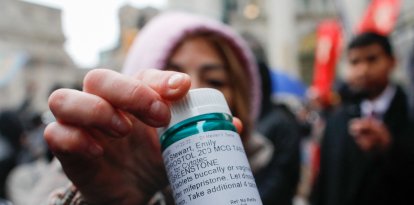FDA knew in 2017 that puberty blockers carry suicide risk
Shannon Sullivan, clinical team leader in the FDA's Division of General Endocrinology, privately acknowledged that drugs promoted for so-called 'gender transition' could increase the risk of depression and lead to death.

LGBT flag.
Shannon Sullivan, clinical team leader for the FDA's Division of General Endocrinology, privately acknowledged that puberty blockers prescribed to trans youth are dangerous. Emails showed that Sullivan recommended seeking approval for puberty blockers despite acknowledging that they increase the risk of depression and suicide.
According to the information, in the leaked email - dated 2017 - Sullivan reported that the FDA's Division of Urology, Obstetrics and Gynecology conducted a review of underage patients who were prescribed puberty blockers and found an "increased risk of depression and suicide, as well as an increased risk of seizures."
"We did find increased risk of depression and suicidality, as well as increased seizure risk and we issued [safety-related labeling changes]," Sullivan said in e-mails first published in the Daily Signal.
However, in the same report, the division led by Sullivan called for approval of the blockers despite those concerns.
"There is definitely a need for these drugs to be approved for gender transition, as they are typically not covered by insurance and are expensive out of pocket," the team leader said.
The emails came to light due to a lawsuit and were delivered by the nonprofit America First Legal. Ian Prior, senior counsel for America First Legal argued that it is unacceptable for the FDA to recommend the use of blockers despite knowing the risks they carry.
"It is shocking and unacceptable that the FDA would admit that puberty blockers cause suicidal ideation and depression, yet in the same breath recommend their approval for transgender ‘medical’ procedures for children," Prior said.
This is not the first time that the risks of trans treatment mainly for minors have come to light. A journalistic work that revealed leaked internal conversations of members of the World Professional Association for Transgender Health (WPATH) who participated in different chats and panels showed that so-called sex transitionshave serious health consequences for people undergoing the treatments.
In the conversations, doctors acknowledge the health problems patients face after having any sex change surgery or receiving the hormone treatments.
The report detailed that WPATH members "often discuss how to improvise treatments as they go along. Members are fully aware that children and adolescents cannot understand the lifelong consequences of 'gender-affirming care' and, in some cases, due to lack of health literacy, their parents cannot either."


























